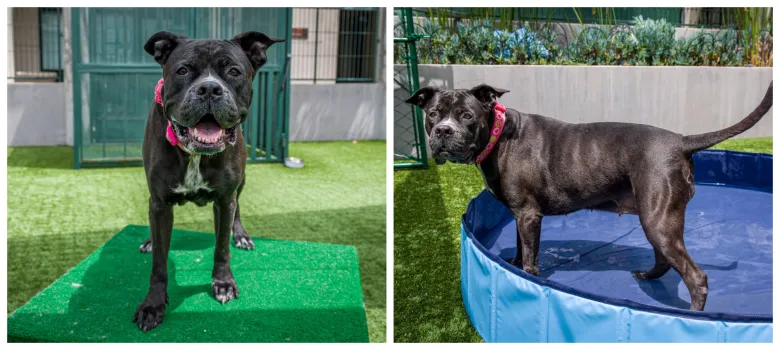Column: Who cares for your pet when you can’t? Make these six plans now

I’m Ahsoka (A514321), a senior mastiff girl! I’m super friendly and love getting attention from people, even if they’re someone I’ve never met before. I adore new smells, never chase squirrels and will happily sit for a treat! I’m pretty much perfect, wouldn’t you agree? Take me home on a 10-day adoption trial and see for yourself just how great I am.
If you read my column last week, you learned about my recent vacation gone awry. I had a bike accident which resulted in a prolonged stay in French hospitals. You may have wondered, what happened to our dog Sueshi during all that time?
When we first moved to Pasadena 5 years ago, we were fortunate to find a nearby family on Rover.com to care for our pooch in their home when we are away.
We call them Sueshi’s “other family.” They generously agreed to extend her stay the whole time we were in France.
They have even continued to care for her since we returned home. And, they are seeing her through previously scheduled knee surgery.
Unfortunately, I haven’t been in shape to walk Sueshi or pick her up. And, my husband Pierce hasn’t had the bandwidth to care for two patients.
I don’t know what we would have done without the Suzuki family!
Sueshi adores them and they love her right back. It is so reassuring to know she is in excellent hands and getting lots of TLC when she is on a staycation with them.
My accident drove home the need to have emergency care plans in place for our pets. Here are a few tips that will help us all to be better prepared in the event of an emergency.
Identify a caretaker in advance
You never know when an emergency will happen. Think ahead and select a friend, family member or facility that can care for your pet in the event you are hospitalized or otherwise unable to do so.
Create an emergency plan
Write up your pet’s care instructions, including your veterinarian’s contact information, a feeding schedule, medications, dietary restrictions and other special needs. Review these instructions with your pet’s emergency caretaker now before an emergency occurs.
Prepare a “go bag”
Assemble an emergency kit for your pet with at least one week’s food and medication. Include other essentials like bowls, a leash and toiletries. Add a few comforts of home, like a favorite toy and bedding.
Keep your pet up to date on vaccines
Proof of current vaccines will be required in the event your pet needs to go into a boarding kennel. It’s a good idea to place copies of your pet’s medical records in the “go bag.”
Make sure your pet has current identification
A pet is more likely to get lost when they are in unfamiliar surroundings. Ensure your pet is wearing a collar with an ID tag and is microchipped. That way, if they do go missing, it will be much easier for them to be reunited with you.
Include your pet in your estate plans
While it can be challenging to think about, death is inevitable for all of us. It’s important to consider what will happen to your pet after you’re gone. By including your pet in your will, you can ensure their ongoing care.
Since returning from France, my husband and I have made arrangements for Sueshi’s “other family” to adopt her in the event that something happens to both of us.
We are revising our will to include a bequest to the Suzuki family to cover the costs of Sueshi’s care in this unlikely circumstance.
Not everyone is as fortunate as we are to have another family that loves our pet as much as we do. Pasadena Humane provides resources to help identify other ways to address your pet’s needs in your estate plans.
To learn more about estate planning and joining our 1903 Society of planned giving donors, please visit pasadenahumane.giftlegacy.com/
Dia DuVernet is president and CEO of Pasadena Humane.
This blog post originally appeared as a column in the Pasadena Star-News on June 14, 2024.



